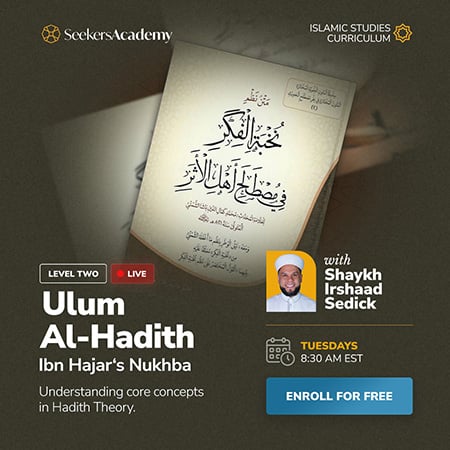
This course thoroughly studies one of the most studied manuals on the Principles of Hadith and its nomenclature written by one of the most influential Hadith scholars of all time - Nukhbat al-Fikar by Imam Ibn Hajar al-Asqalani (Allah have mercy on him) (852 AH). The text is usually studied after the completion of al-Bayquniyyh, and it is considered the gateway for studying the upper-intermediate and advanced textbooks of Hadith sciences. It is also considered the key to understanding the methodology of the scholars of Hadith from the 8th and 9th centuries onward because most of the scholars of Hadith after Ibn Hajar followed his systematic approach.
By carefully examining the definitions of Hadith principles and nomenclature included in the Nukhba, students can conceptualize the criteria and application of Hadith authentication. The course will also provide a thorough introduction that covers the epistemological underpinnings of Hadith as a reliable source of knowledge, the intellectual history of Hadith sciences, and the tradition of teaching Nukhbat al-Fikar.
While maintaining focused attention on conveying the objectives of the Nukhba as intended by its author, the course will briefly touch upon the key variations between the early and the late schools of Hadith as well as the significant differences between the methodologies of Ahl al-Hadith and the Hanafis.
- Teacher: Mawlana Irshaad Sedick
Delve into the heart of Hadith sciences with ‘Nukhbat al-Fikar,’ a cornerstone work penned by the distinguished Ibn Hajar al-Asqalani (may Allah have mercy on him), a titan in the study of Hadith. Since its inception, this seminal text has marked a pivotal moment in the scholarly pursuit of Islamic traditions, representing the first canonical framework for understanding the principles of Hadith.
But what makes ‘Nukhbat al-Fikar’ so revolutionary? Beyond its concise distillation of prior works, its true innovation lies in its logical organization and systematic approach to Hadith sciences and terminology, establishing it as the inaugural “matn” (a foundational text) dedicated to the principles of Hadith.
Upon its completion, ‘Nukhbat al-Fikar’ quickly garnered acclaim from Ibn Hajar’s mentors and disciples, establishing a legacy of scholarship. The text’s profound impact is further evidenced by the swift emergence of commentaries, beginning with those from Ibn Hajar's teachers and then his expansive elucidation, ‘Nuzhat al-Nazar.’ This dialogue between ‘Nukhbat al-Fikar,’ its commentaries, and super-commentaries has enriched Islamic scholarship, creating a vibrant study tradition around the text.
Today, ‘Nukhbat al-Fikar’ is not just a work of historical significance; it is a living part of the curriculum in Islamic studies across madrasas and institutes worldwide. Its continued relevance and the tradition of scholarship it inspired are a testament to Ibn Hajar al-Asqalani’s unparalleled contribution to Islamic sciences. Engage with ‘Nukhbat al-Fikar’ and connect with a rich legacy of scholarly inquiry that continues to illuminate the path for students of Hadith across the globe.
This course is meticulously designed for adult learners eager to deepen their understanding and mastery of Hadith sciences. It is classified as a Level Two course, indicating that it builds upon foundational knowledge that participants are expected to have before enrollment.
Ideal participants for this course include
Individuals who have completed foundational courses, specifically "An Introduction to the Science of Hadith: Bayquni's Hadith Terminology" and "Abhari’s Isaghuji: An Introduction to Traditional Logic". These courses lay the groundwork necessary for a comprehensive understanding of the material covered in this more advanced course.
Learners with a keen interest in the intricacies of Hadith authentication processes, including the rigorous requirements that Hadith must meet to be considered authentic.
Those who wish to explore the methodology of verifying the credibility of Hadith narrators, an essential aspect of Islamic scholarship.
Participants eager to understand the dynamics of Hadith transmission, including the evaluation of chains of narration, which is crucial for assessing the authenticity and reliability of Hadith.
In summary, this course is ideally suited for individuals dedicated to advancing their expertise in Hadith sciences, particularly emphasising the authentication process, narrator verification, and understanding the complexities of Hadith transmission. It promises to be an enriching experience for anyone committed to delving deeper into the study of Hadith.
- Grasp the epistemological underpinnings of the Sunna, recognizing its role and reliability as a vital source of Islamic knowledge.
- Acquire the ability to discern and interpret Hadith terminology, appreciating the contextual nuances embedded within.
- Gain a comprehensive understanding of the Hadith authentication process, including its rigorous requirements.
- Master the methods used to verify the credibility of Hadith narrators.
- Develop a deep understanding of the various disciplines within Hadith sciences and their significance in the authentication process.
- Learn to categorize Hadith based on their degrees of acceptance or rejection, enhancing their critical evaluation skills.
- Understand the intricacies involved in the transmission and assessment of Hadith chains of narration, facilitating a nuanced appreciation of Hadith reliability.
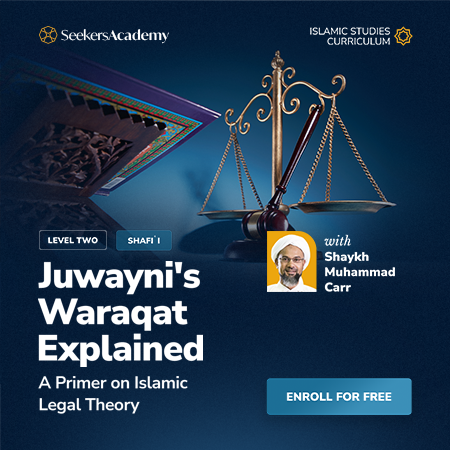
This thought provoking and insightful intermediate (Level Two) course in Islamic Legal Theory is for anyone seeking to gain an appreciation of how Islamic Law works. Imam Juwayni, author of the Waarqat was an imam (i.e., someone who is taken as an exemplar) of the Islamic sciences in the fullest sense of the word: he authored multi-volume seminal works in Shafi‘i jurisprudence, Islamic theology, and Islamic legal theory.
The Waraqat is a short work that brings the science of Islamic legal theory down to the level of an absolute beginner. The main benefit of this course is to illustrate how Islamic law is derived from its sources and equip you with the tools required to extrapolate law from the Qur’an and sunna. The course sets a foundation and framework for further studies in Usul (Islamic legal Theory) . An outcome of this course is to allow students to understand the depth and robust nature of Islamic Law. The course also allows you to better appreciate scholarly differences by virtue of appreciating the underlying differences. By taking this course, students will be able to locate traditional fiqh within the Qur’an and sunna and also deal with differences in society in a more cohesive manner.
- Teacher: Shaykh Muhammad Carr
The Waraqat, a primer on Islamic legal theory (Usul al-fiqh) by Imam al-Haramayn al-Juwayni (d. 478 A.H. / 1085 C.E.), is an important text that covers the integrals of Islamic legal theory namely: sources of Islamic Law, types of speech, modes of extrapolation, and the condition of the extrapolator in terms of being an original thinker or otherwise.
The text is significant due to the author and the prominence that Allah has afforded it. Imam al-Juwayni was an imam (i.e., someone who is taken as an exemplar) of the Islamic sciences in the fullest sense of the word. His al-Waraqat is a short work that brings his vast scholarship in the science of Islamic legal theory down to the level of an absolute beginner. Ever since it was written almost a thousand years ago, students of the Shafi‘i, Maliki, and Hanbali schools have successfully used it to begin their study of Islamic legal theory.
The Waraqat is taught in light of the renowned sharh (explanatory notes) provided by Jalal al-din al-Mahalli. The more extensive sharh by Ibn al-Firkah was also consulted as part of the preparation for this course.
- This course is for students of the Islamic sciences
- It is particularly beneficial for students wanting to gain a deeper understanding and appreciation of Islamic Law
- It is a level 2 course and a student must have finished all the level one courses.
- This course can also be taken by anyone who is interested in learning more about how Islamic Law works and those wishing to pave a career in fiqh.
- Explain what Islamic legal theory is and why it needs to be studied.
- Learn how to interpret the Qur’an and Sunna.
- Memorize the definitions of key terms in the science of Islamic legal theory.
- Appreciate the depth of scholarship of Islamic jurisprudence.
- Apply the techniques of Islamic legal theory to gain clarity on contemporary religious debates about literalism, ijtihad and taqlid.
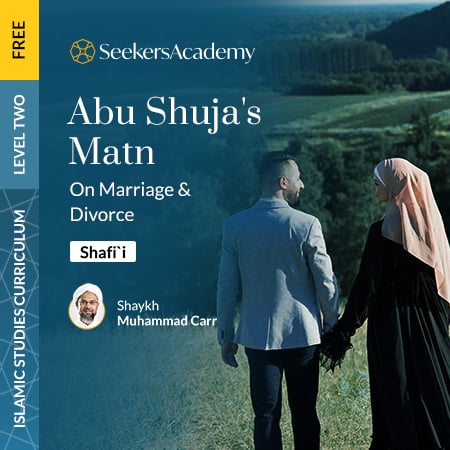
This is a Level Two course in the Islamic Studies Curriculum. This course is based on the renowned text Matn Abu Shuja.
This course serves to provide a proper understanding of the Islamic rulings of family law according to the Shafi‘i school. Topics covered include when it is required, sunna, or even prohibited to marry; the integrals and conditions of the marriage, and whom it is valid to marry. In addition, the rulings of divorce are outlined, detailing the cases of when it occurs, and the scenarios of its being binding or revocable. Finally, the course covers related issues such as the waiting period (`idda) providing for needy relatives and the rulings of child custody.
This course is ideal for students of Islamic knowledge.A previous study of Fiqh such as Ba Fadl’s The Short Abridgement is recommended.
This course is an explanation of Matn Abi Shuja’, written by the learned and pious Shafi‘i scholar from Basra, Ahmad ibn al Hussein al-Asfahani (d. 500’s AH / 1100’s CE), more famously known as Abu Shuja‘. His Matn Abi Shuja‘, a short introduction to the Shafi‘i school of sacred law, is one of the most blessed textbooks of the school–although it was written almost a millennium ago, it remains an integral part of Shafi‘i fiqh curricula all over the world and has been the subject of dozens of commentaries and super-commentaries ever since it was written all the way down to the present age.
- This course is for adults.
- It is particularly beneficial for students of sacred law .
- It is a Level Two course. In order to successfully complete this course, students should take On Worship (Purification, Prayer, Fasting, Zakat, and Hajj): Ba Fadl's The Short Abridgement.
- This course can also be taken by anyone who is interested in learning more about the rulings of marriage and divorce in the Shafi‘i school.
- Understand key topics, including charitable engagements, who should get married, and how it should be done from beginning to end.
- Learn The details of the shares inherited from family members, those one inherits from and, those one does not, and how the shares can vary based on the combinations of living heirs.
- Understand how an Islamic marriage is terminated.
- Learn what the financial obligations are towards one’s family members.
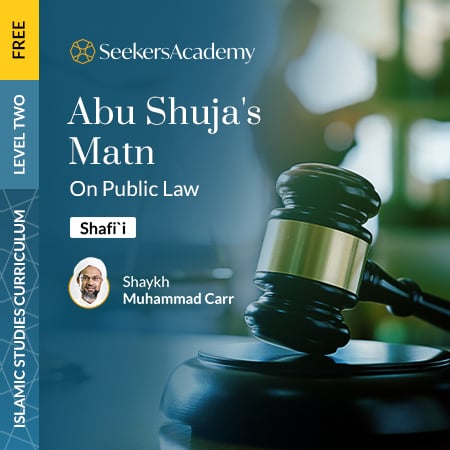
This is a Level Two course in the Islamic Studies Curriculum. This course is based on the renowned text Matn Abu Shuja.
This course serves to provide a proper understanding of the Islamic rulings of public law according to the Shafi‘i school. Topics covered include the rulings of public law as well as the impact these rulings have and the wisdom behind them. They cover the issues of crime and punishment, the permissible and impermissible, court procedures, witnesses, oaths, the mercy of the Sacred Law, and more.
The purpose of the sacred law is to preserve the life, wealth, intellect, property, and honor of each individual. How does the Islamic legal code achieve that? How do the laws of Qisas (retaliation), and Hudud (punishments for contravention of limits) serve to give life to the community? These Islamic punishments cannot be applied by vigilante justice. There is immense wisdom in Islamic legal practices, and there are many strict requirements that must be fulfilled before the laws are applied.
This course is ideal for students of Islamic knowledge. A previous study of Islamic law is recommended.
This course is an explanation of Matn Abi Shuja’, written by the learned and pious Shafi‘i scholar from Basra, Ahmad ibn al Hussein al-Asfahani (d. 500’s AH / 1100’s CE), more famously known as Abu Shuja‘. His Matn Abi Shuja‘, a short introduction to the Shafi‘i school of sacred law, is one of the most blessed textbooks of the school–although it was written almost a millennium ago, it remains an integral part of Shafi‘i fiqh curricula all over the world and has been the subject of dozens of commentaries and super-commentaries ever since it was written all the way down to the present age.
- This course is for adults.
- It is particularly beneficial for students of sacred law.
- It is a Level Two course. In order to successfully complete this course, students should take On Worship (Purification, Prayer, Fasting, Zakat, and Hajj): Ba Fadl's The Short Abridgement.
- This course can also be taken by anyone who is interested in learning more about the rulings of public law past the basic level in the Shafi‘i school.
- Understand how Islam joins between the spirit and the letter of the Sacred Law.
- Learn how Islam promotes law and order.
- Understand how flexible Sharia law can be.
- Learn what valid oaths and vows are.
- Understand how Islamic law fits into the current political climate.

This is a Level Two course in the Islamic Studies Curriculum. It serves to provide a proper understanding of the Islamic rulings of trade and transactions according to the Shafi‘i school.
In this course, Shaykh Carr covers the chapters on financial transactions from the renowned text Matn Abu Shuja. Students will learn the legal rulings related to contracts, the sales contract, permissible and impermissible conditions in contracts, the elements of sound and unsound transactions, and other issues related to commercial transactions. These include the prohibitions of riba (usury), how to secure contracts through collateral and guarantors, types of partnerships and companies, contracts of hire and leasing, types of financing, and more.
This course is fundamental to students of knowledge completing the Islamic Studies Curriculum. A previous study of Islamic law (fiqh) is recommended.
This course is an explanation of Matn Abi Shuja’, written by the learned and pious Shafi‘i scholar from Basra, Ahmad ibn al Hussein al-Asfahani (d. 500’s AH / 1100’s CE), more famously known as Abu Shuja‘. His Matn Abi Shuja‘, a short introduction to the Shafi‘i school of sacred law, is one of the most blessed textbooks of the school–although it was written almost a millennium ago, it remains an integral part of Shafi‘i fiqh curricula all over the world and has been the subject of dozens of commentaries and super-commentaries ever since it was written all the way down to the present age.
- It is particularly beneficial for students of sacred law.
- It is a Level Two course. In order to successfully complete this course, students should take On Worship (Purification, Prayer, Fasting, Zakat, and Hajj): Ba Fadl's The Short Abridgement.
- This course can also be taken by anyone who is interested in learning more about the rulings of financial transactions in the Shafi‘i school.
- Understand the technical side of the vast majority of financial and familial relations that a Muslim will get involved in his/her life.
- Learn the rulings of the various types of sales.
- Understand, how “interest” can be avoided in sales and currency exchange.
- Learn the various forms of canceling a sales contract.
- Understand the rulings of forward sales, and debt transfers.
- The concept of financial liability and legal liability it discussed along with various forms of investing money in a halal way.
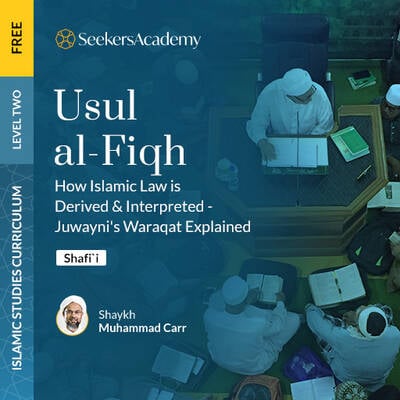
This thought-provoking and insightful intermediate (Level Two) course in Islamic Legal Theory is for anyone seeking to gain an appreciation of how Islamic Law works.
Imam Juwayni, author of the Waraqat was an imam (i.e., someone who is taken as an exemplar) of the Islamic sciences in the fullest sense of the word: he authored multi-volume seminal works in Shafi‘i jurisprudence, Islamic theology, and Islamic legal theory.
The main benefit of this course is to illustrate how Islamic law is derived from its sources and equip you with the tools required to extrapolate law from the Qur’an and sunna.
The course sets a foundation and framework for further studies in Usul (Islamic legal Theory) .
By taking this course, students will be able to locate traditional fiqh within the Qur’an and sunna and also deal with differences in society in a more cohesive manner.
- Teacher: Shaykh Muhammad Carr
The Waraqat, a primer on Islamic legal theory (Usul al-fiqh) by Imam Juwayni (d. 478 A.H. / 1085 C.E.), is an important text that covers the integrals of Islamic legal theory namely: sources of Islamic Law, types of speech, modes of extrapolation, and the condition of the extrapolator in terms of being an original thinker or otherwise.
The text is significant due to the author and the prominence that Allah has afforded it. Imam Juwayni was an imam (i.e., someone who is taken as an exemplar) of the Islamic sciences in the fullest sense of the word. His Waraqat is a short work that brings his vast scholarship in the science of Islamic legal theory down to the level of an absolute beginner. Ever since it was written almost a thousand years ago, students of the Shafi‘i, Maliki, and Hanbali schools have successfully used it to begin their study of Islamic legal theory.
The Waraqat is taught in light of the renowned sharh (explanatory notes) provided by Jalal al-din al-Mahalli. The more extensive sharh by Ibn al-Firkah was also consulted as part of the preparation for this course.
- This course is for students of the Islamic sciences. It is particularly beneficial for students wanting to gain a deeper understanding and appreciation of Islamic Law
- It is a level 2 course and a student must have finished all the level one courses.
- This course can also be taken by anyone who is interested in learning more about how Islamic Law works and those wishing to pave a career in fiqh.
- Explain what Islamic legal theory is and why it needs to be studied
- Learn how to interpret the Qur’an and Sunna
- Memorize the definitions of key terms in the science of Islamic legal theory
- Appreciate the depth of scholarship of Islamic jurisprudence
- Apply the techniques of Islamic legal theory to gain clarity on contemporary religious debates about literalism, ijtihad and taqlid.
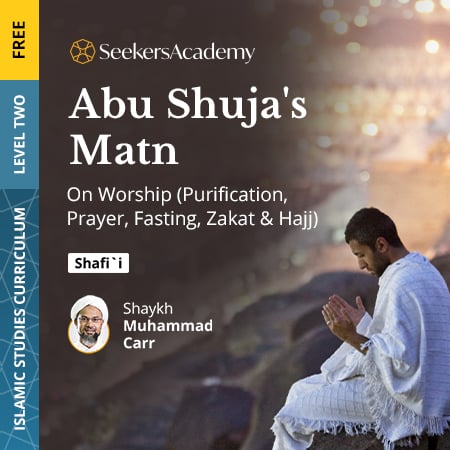
Every human action has a divine command associated with it, making it obligatory, recommended, permissible, offensive, or unlawful. We cannot infer these commands with our minds–the only way to learn about them is by learning them from the Prophet (Allah bless him and give him peace). The goal of the science of sacred law (fiqh) is to accurately guide us on what the Prophet (Allah bless him and give him peace) taught us about all human actions, whether related to worship, trade, investment, food, hunting, oaths, entertainment, marriage, divorce, inheritance, legal procedures, or public policy.
This four-part series of courses will introduce you to the science of sacred law as it relates to all aspects of life, focusing in this first part on the rules of purification and prayer.
- Teacher: Shaykh Muhammad Carr
This course is an explanation of Matn Abi Shuja’, written by the learned and pious Shafi‘i scholar from Basra, Ahmad ibn al Hussein al-Asfahani (d. 500’s AH / 1100’s CE), more famously known as Abu Shuja‘. His Matn Abi Shuja‘, a short introduction to the Shafi‘i school of sacred law, is one of the most blessed textbooks of the school–although it was written almost a millennium ago, it remains an integral part of Shafi‘i fiqh curricula all over the world and has been the subject of dozens of commentaries and super-commentaries ever since it was written all the way down to the present age.
- This course is for adults.
- It is particularly beneficial for students of sacred law.
- It is a Level Two course. In order to successfully complete this course, students should take On Worship (Purification, Prayer, Fasting, Zakat, and Hajj): Ba Fadl's The Short Abridgement.
- This course can also be taken by anyone who is interested in learning more about the rulings of financial transactions in the Shafi‘i school.
- Describe the historical development of the Shafi‘i school
- Learn the rules of purification, prayer, clothing, funeral rites, fasting, zakat, and Hajj.
- Memorize the definitions of key terms related to the rules of purification, prayer, clothing, funeral rites, fasting, zakat, and Hajj.
- Appreciate the depth of the Muslim scholarly tradition